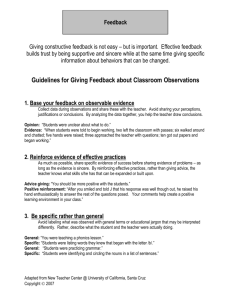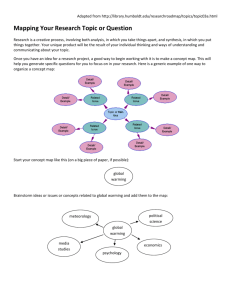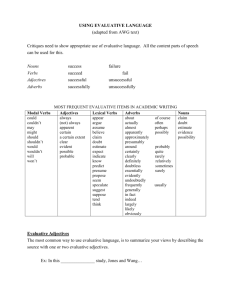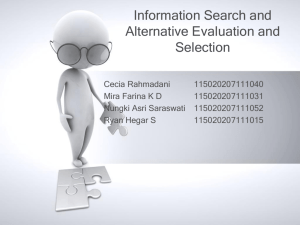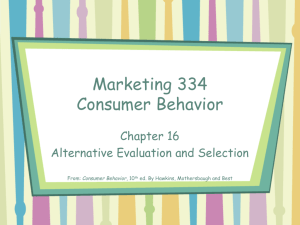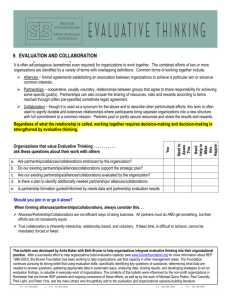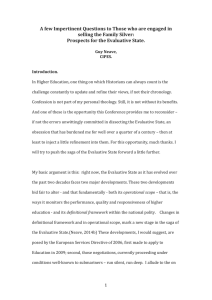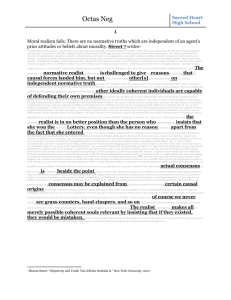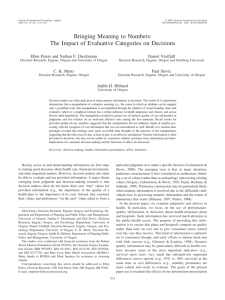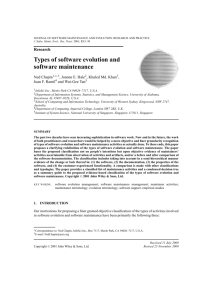ENG1111: The English Language – Awareness
advertisement
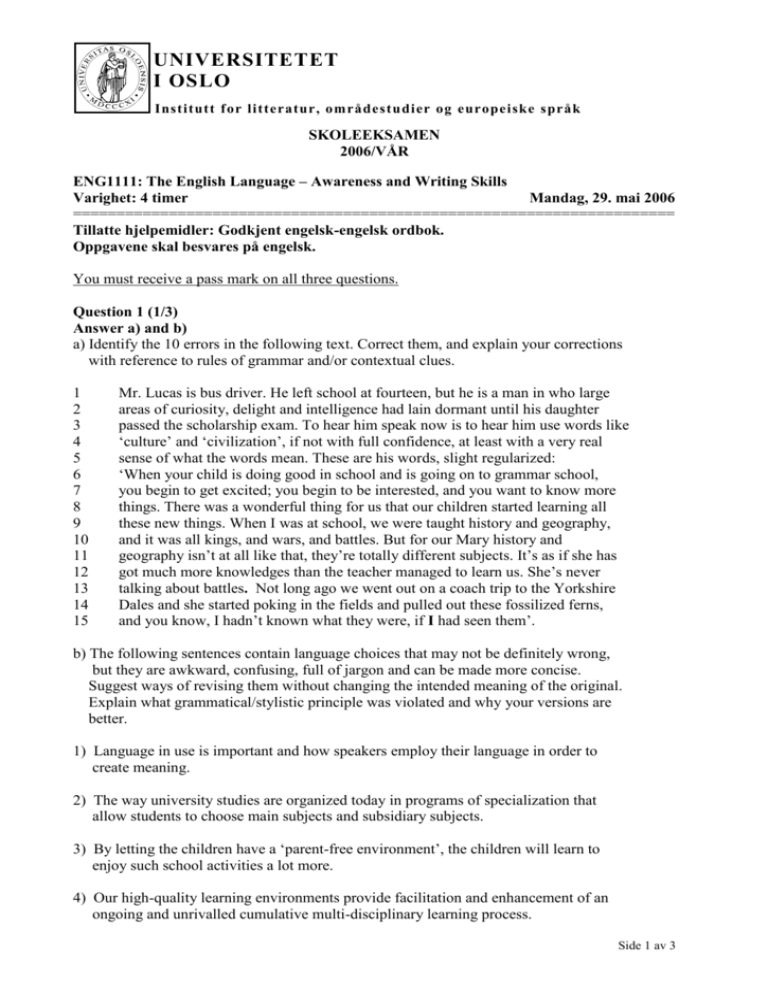
UNIVERSITETET I OSLO Institutt f or litteratur, områdestudier og europeiske språk SKOLEEKSAMEN 2006/VÅR ENG1111: The English Language – Awareness and Writing Skills Varighet: 4 timer Mandag, 29. mai 2006 ===================================================================== Tillatte hjelpemidler: Godkjent engelsk-engelsk ordbok. Oppgavene skal besvares på engelsk. You must receive a pass mark on all three questions. Question 1 (1/3) Answer a) and b) a) Identify the 10 errors in the following text. Correct them, and explain your corrections with reference to rules of grammar and/or contextual clues. 1 2 3 4 5 6 7 8 9 10 11 12 13 14 15 Mr. Lucas is bus driver. He left school at fourteen, but he is a man in who large areas of curiosity, delight and intelligence had lain dormant until his daughter passed the scholarship exam. To hear him speak now is to hear him use words like ‘culture’ and ‘civilization’, if not with full confidence, at least with a very real sense of what the words mean. These are his words, slight regularized: ‘When your child is doing good in school and is going on to grammar school, you begin to get excited; you begin to be interested, and you want to know more things. There was a wonderful thing for us that our children started learning all these new things. When I was at school, we were taught history and geography, and it was all kings, and wars, and battles. But for our Mary history and geography isn’t at all like that, they’re totally different subjects. It’s as if she has got much more knowledges than the teacher managed to learn us. She’s never talking about battles. Not long ago we went out on a coach trip to the Yorkshire Dales and she started poking in the fields and pulled out these fossilized ferns, and you know, I hadn’t known what they were, if I had seen them’. b) The following sentences contain language choices that may not be definitely wrong, but they are awkward, confusing, full of jargon and can be made more concise. Suggest ways of revising them without changing the intended meaning of the original. Explain what grammatical/stylistic principle was violated and why your versions are better. 1) Language in use is important and how speakers employ their language in order to create meaning. 2) The way university studies are organized today in programs of specialization that allow students to choose main subjects and subsidiary subjects. 3) By letting the children have a ‘parent-free environment’, the children will learn to enjoy such school activities a lot more. 4) Our high-quality learning environments provide facilitation and enhancement of an ongoing and unrivalled cumulative multi-disciplinary learning process. Side 1 av 3 Question 2 (1/3) Read the texts below and answer the questions at the end. Text 1 1 This chapter has attempted to test the applicability of a local grammar to the 2 concept of evaluation. Although no attempt has been made to build the grammar 3 as a computer model, enough evidence has perhaps been amassed to judge 4 whether such an enterprise might be successful or not. It has been shown, for 5 example, that it is possible to identify some patterns whose primary purpose is to 6 evaluate, or to attribute evaluation to another speaker, and which therefore tend to 7 select evaluative adjectives. These patterns may be used as a ‘diagnostic’ for 8 evaluative adjectives. It is likely that adjectives that sometimes appear in 9 particular patterns are evaluative even when they are used in other patterns. It is 10 not possible to be 100 percent certain of this, however, partly because some 11 adjectives have one or more evaluative sense(s) and one or more non-evaluative 12 sense(s), and partly because some evaluative patterns are used creatively, making 13 a non-evaluative adjective temporarily evaluative. (From: S. Hunston and G. Thompson, Evaluation in Text – (slightly adapted)) Text 2 1 Does your enterprise need a little assistance? 2 3 4 5 6 7 8 9 10 Your business needs customers and it’s important to help them find you easily. A simple solution is to beef up your entry in the Phone Book. For a small charge, we’ll print your name, address and number in big bold type. For just a little more, we’ll make them even bigger and easier to find. The number of phone calls made every week in business after referring to the Phone Book is a staggering twentyseven million. It only takes one, though, to find out how to get your fair share of them. Just dial 100 and ask for Freefone Phone Books. The better you stand out, the easier it will be for your customers to find you. And the more likely it is you’ll grow where no business has grown before. 11 Simple, isn’t it? (From R. Carter et al., Working with Texts- (slightly adapted)) a) b) Account briefly for the field, tenor, mode and purpose of each text. Identify language resources, both grammatical and lexical, that can be said to be characteristic of these two text types. Write some 20-25 lines and refer to examples from the material. Side 2 av 3 Question 3 (1/3) Write about 500 words on ONE of the following topics. a Read the extract below. Discuss the position put forward. Call your essay: Solidarity. Solidarity isn't nostalgia, it's a necessity for our times. - Solidarity may be an unfashionable virtue today, but it is the best - and often the only - defence most people have in a world dominated by big money, growing inequality and unrestrained profit-making. May Day has, for over a century, been the day working people have proclaimed their common interests across industries and countries. Its message of the necessity for solidarity is even more decisive than in the past. [By Tony Woodley, adapted from The Guardian, May 1, 2006] b Read the extract below. Discuss the position put forward. Call your essay: Global warming. Global warming is a serious threat. - There is growing public acceptance of the need for action on global warming. We must come up with serious, comprehensive and properly funded policies, even if they are controversial and ask for tough choices, in every aspect of our lives. People might have to travel less or pay a bit more for food. Recycling and loft-lagging are not enough; people need to be encouraged to look at the impact on global warming of every aspect of their lives. But, tackling global warming does not need to be about self-denial; there are exciting opportunities to boost innovation and competitiveness and to create jobs. [Leader, adapted from The Observer, Sunday April 16, 2006] c In About a Boy by Nick Hornby, twelve-year-old Marcus is looking for a stepfather, and thirty-six year-old Will wants to live a carefree life. How does their relationship develop? Call your essay: Will and Marcus. SENSUREN KUNNGJØRES INNEN 19.06.2006. Side 3 av 3
